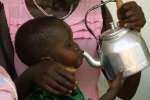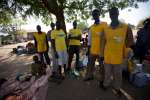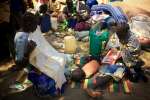- Text size
 |
|  |
|  |
| 
- Français
Sudanese refugees find fame in Japan, raise money for education in Africa
News Stories, 26 July 2010
NAIROBI, Kenya, July 26 (UNHCR) – Sudanese refugee Josephine Poni Daniel can be as shy as any other 16-year-old when discussing unfamiliar subjects. But ask about her first love, music, and her face brightens and she becomes vivacious and outspoken.
"Music is fun; when I write lyrics or sing the music I feel good and forget my troubles," says Josephine, lead singer for The Golden Blue Girls, one of three winners of a music contest that's raising money and awareness of refugees' education needs in far-off Japan.
Last year a visiting Japanese guitarist, one-half of the popular duo Yuzu, was amazed by the musical talent on display in the Dadaab complex of three camps, home to 260,000 refugees in eastern Kenya. He went home and worked with fundraiser Japan for UNHCR and the FilmAid humanitarian organization to not only bring the talented refugees to world attention, but also raise money for secondary education in the camp.
The result was the Camp Beat Music Competition that provided huge entertainment for the mainly Somali refugees at Dadaab earlier this year. Competitors were winnowed to 21 groups and soloists, and finally three finalists, including Josephine's group as well as two Congolese and Somali soloists. The three finalists won trips to Nairobi to make professional videos for public on-line voting in Japan.
Josephine, her 13-year-old sister Scovia, back-up singer Silvia Deva, also 13, and the only male member, keyboardist Emanuel Sida, 16, had all sung together in a church choir before they were forced to flee fighting in Kajo Keji in South Sudan in 2000. Neighbours at home in Sudan, their families remain neighbours in the sprawling Dagaheley camp in the Dadaab complex, and they go to school together.
Education is the quartet's top priority, and it was the subject of their prize-winning song. Aside from the opportunity to go to school in Dadaab, Emanuel admits life in a refugee camp can be tough: "There is not enough water and food, it's very hot and people have nothing to do – they lose hope."
But in the original song they recorded in Nairobi for the Japanese website – Africa Song – they struck a more optimistic note.
"I think it's important for the world to know how beautiful Africa is," says Josephine. "When people from the West hear about Africa, they think about wars and starving children. But Africa is so much more: Africa is love, beauty, wonderful colours and music. People might understand that better if they hear our song."
Although the overall contest winner will not be announced in Japan until next week, just participating is already prompting the Golden Blue Girls to dream big.
"We want to inspire the world," says Josephine. Adds Scovia: "We'll release a record and then we hope to become world famous."
But not to worry if it doesn't work out. Silvia has a back-up plan: "I will be the president of South Sudan – if our music career doesn't kick off," she laughs.
By Dina Skatvedt Rygg
In Nairobi, Kenya


















































